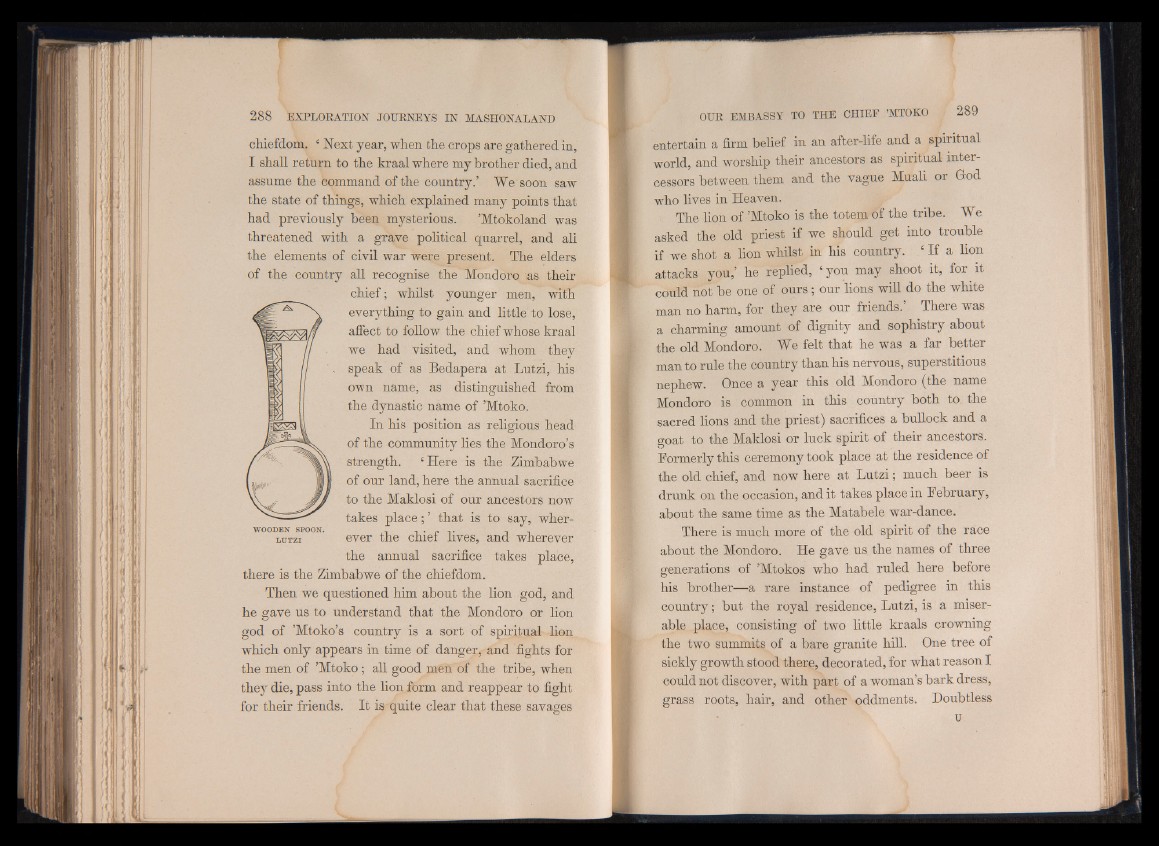
chiefdom. 4 Next year, when the crops are gathered in,
I shall return to the kraal where my brother died, and
assume the command of the country.’ We soon saw
the state of things, which explained many points that
had previously been mysterious. ’Mtokoland was
threatened with a grave political quarrel, and all
the elements of civil war were present. The elders
of the country all recognise the Mondoro as their
chief; whilst younger men, with
everything to gain and little to lose,
affect to follow the chief whose kraal
we had visited, and whom they
speak of as Bedapera at Lutzi, his
own name, as distinguished from
the dynastic name of ’Mtoko.
In his position as religious head
of the community lies the Mondoro’s
strength. 4 Here is the Zimbabwe
of our land, here the annual sacrifice
to the Maklosi of our ancestors now
takes place; ’ that is to say, wherever
the chief lives, and wherever
the annual sacrifice takes place,
W O O D EN SPOON.
L U T Z I
there is the Zimbabwe of the chiefdom.
Then we questioned him about the lion god, and
he gave us to understand that the Mondoro or lion
god of ’Mtoko’s country is a sort of spiritual lion
which only appears in time of danger, and fights for
the men of ’Mtoko; all good men of the tribe, when
they die, pass into the lion form and reappear to fight
for their friends. It is quite clear that these savages
entertain a firm belief in an after-life and a spiritual
world, and worship their ancestors as spiritual intercessors
between them and the vague Muali or God
who lives in Heaven.
The lion of ’Mtoko is the totem of the tribe. We
asked the old priest if we should get into trouble
if we shot a lion whilst in his country. 4 If a lion
attacks you,’ he replied, 4 you may shoot it, for it
could not be one of ours ; our lions will do the white
man no harm, for they are our friends.’ There was
a charming amount of dignity and sophistry about
the old Mondoro. We felt that he was a far better
man to rule the country than his nervous, superstitious
nephew. Once a year this old Mondoro (the name
Mondoro is common in this country both to. the
sacred lions and the priest) sacrifices a bullock and a
goat to the Maklosi or luck spirit of their ancestors.
Formerly this ceremony took place at the residence of
the old chief, and now here at Lutzi; much beer is
drunk on the occasion, and it takes place in February,
about the same time as the Matabele war-dance.
There is much more of the old spirit of the race
about the Mondoro. He gave us the names of three
generations of ’Mtokos who had ruled here before
his brother—a rare instance of pedigree in this
country; but the royal residence, Lutzi, is a miserable
place, consisting of two little kraals crowning
the two summits of a bare granite hill. One tree of
sickly growth stood there, decorated, for what reason I
could not discover, with part of a woman’s bark dress,
grass roots, hair, and other oddments. Doubtless